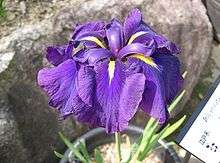Iris ser. Laevigatae
| Iris ser. Laevigatae | |
|---|---|
 | |
| Iris ensata var. ensata | |
| Scientific classification | |
| Kingdom: | Plantae |
| (unranked): | Angiosperms |
| (unranked): | Monocots |
| Order: | Asparagales |
| Family: | Iridaceae |
| Genus: | Iris |
| Subgenus: | I. subg. Limniris |
| Series: | I. ser. Laevigatae Diels (Lawrence) |
Iris ser. Laevigatae is a series of the genus Iris, in Iris subg. Limniris.
The series was first classified by Diels in 'Die Natürlichen Pflanzenfamilien' (Edited by H. G. A. Engler and K. Prantl) in 1930. It was further expanded by Lawrence in Gentes Herb (written in dutch) in 1953.[1][2][3][4]
This is a group of mainly moisture loving plants from Europe, Asia and North America. They generally need rich fertile soils,[5] they can tolerate soils with a little lime.[6] They generally flower between early and mid-summer. [5] They have vigorous rhizomes and leaves. They can be easily cultivated in British gardens.[6] The leaves have small blackish spots along the veins. This can be seen when holding the leaf up to the light or under a microscope. This trait means that the species can tolerate moist soils.[7]
They can also cross pollinate between species to create hybrids.[7]
It includes:
- Iris ensata Thunb. – Japanese iris, hanashōbu (Japanese) (including I. kaempferi)
- Iris laevigata Fisch – rabbit-ear iris, shallow-flowered iris, kakitsubata (Japanese)
- Iris maackii Maxim.
- Iris pseudacorus L. – yellow iris, yellow flag
- Iris versicolor L. – larger blue flag, harlequin blueflag
- Iris virginica L. – Virginia iris
References
- ↑ "FNA Vol. 26". efloras.org. Retrieved 23 October 2014.
- ↑ "Iris ser. Laevigatae (Diels) G.H.M. Lawrence". data.canadensys.net. Retrieved 23 October 2014.
- ↑ James Cullen, Sabina G. Knees, H. Suzanne Cubey (Editors) The European Garden Flora Flowering Plants: A Manual for the Identification, p. 647, at Google Books
- ↑ "Entry for Iris Linnaeus subg. Limniris section Limniris series Laevigatae (Diels) G. H. M. Lawrence [family IRIDACEAE]". plants.jstor.org. Retrieved 23 October 2014.
- 1 2 Stebbings, Geoff (1997). The Gardener's Guide to Growing Irises. Newton Abbot: David and Charles. pp. 17–18. ISBN 0715305395.
- 1 2 Cassidy, George E.; Linnegar, Sidney (1987). Growing Irises (Revised ed.). Bromley: Christopher Helm. p. 136. ISBN 0-88192-089-4.
- 1 2 Austin, Claire. "Irises A Garden Encyclopedia" (pdf). worldtracker.org. p. 231. Retrieved 22 October 2014.
External links
 Data related to Iris ser. Laevigatae at Wikispecies
Data related to Iris ser. Laevigatae at Wikispecies